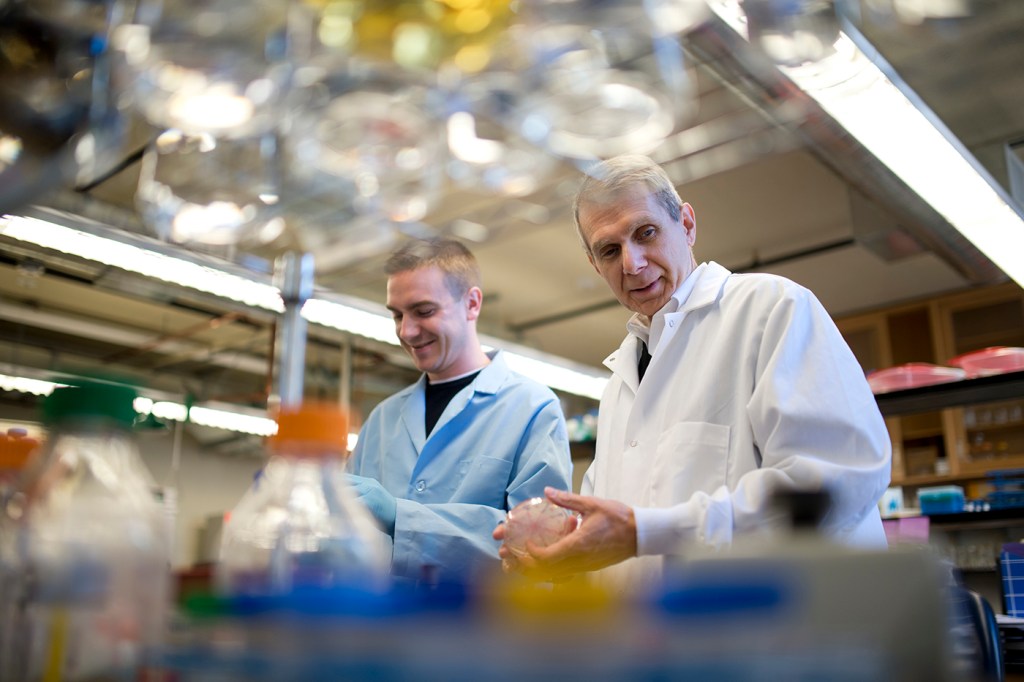Groundbreaking Northeastern research sweeps the globe

Northeastern University Distinguished Professor Kim Lewis, professor of biology Slava Epstein, and their team’s pioneering research presenting a new antibiotic that kills pathogens without encountering any detectable resistance has captured headlines worldwide and drawn widespread praise from the scientific community.
The groundbreaking research was published Wednesday in the journal Nature, and the news quickly gained momentum. The New York Times, CBS News, BBC World News, National Geographic, and The Wall Street Journal were among the many news outlets featuring coverage of this new antibiotic, called teixobactin, and the Northeastern research that has paved the way for its discovery. The story rocketed to the top of BBC World News’ “Most Popular” stories section on its homepage by midday Thursday, and also rose to No. 2 on The New York Times website’s “most emailed” stories.
“Rarely is a discovery made that improves the health of human beings around the globe,” said Joseph E. Aoun, president of Northeastern University. “Professor Kim Lewis and his team have made history with their discovery in a field that has not seen a breakthrough in nearly three decades. This innovative and unconventional breakthrough is precisely the kind of research Northeastern brings to the world.”
The impressive work dovetails with Northeastern’s focus on use-inspired research that solves global challenges, particularly in health, security, and sustainability, and builds upon the university’s leading research in the areas of drug discovery and delivery.
Lewis noted that this marks the first discovery of an antibiotic to which resistance by mutations of pathogens have not been identified. It also presents a promising opportunity to building upon these findings and ultimately develop drugs that can treat chronic infections in humans caused by staphylococcus aureus, or MRSA, that are highly resistant to antibiotics, as well as tuberculosis, which involves a combination of therapies with negative side effects.
“The most intriguing thing about this compound is the apparent absence of resistance development,” Lewis told National Public Radio. “This for all practical purposes may be a largely resistance-free compound.”
The story was widely shared via social media, with many from the Northeastern community and beyond applauding the work and congratulating the researchers involved.
Lewis and his colleagues say pathogens’ resistance to antibiotics is causing a public health crisis, one in which infections have for years remained one step ahead of researchers. But he and Northeastern biology professor Slava Epstein developed a novel method for growing uncultured bacteria—a previously untapped source of antibiotics beyond those created by synthetic means. Their approach involves the iChip, a miniature device that can isolate and help grow single cells in their natural environment. Their innovative method to bring the environment into the lab holds great promise in helping to combat this health crisis.

The iChip, a miniature device professor Slava Epstein’s team created that can isolate and help grow single cells in their natural environment, and thereby provide researchers with much improved access to uncultured bacteria. Photo courtesy of Slava Epstein/Northeastern University.
The National Institutes of Health, in part, funded the research. “This discovery is exactly the kind of breakthrough we were hoping for when we started the Transformative Research Awards program, which supports exceptionally innovative, paradigm-shifting research projects,” said James Anderson, MD, PhD, director of the Division of Program Coordination, Planning and Strategic Initiatives at the NIH. “The work of Dr. Lewis and his team holds great importance because it is leading to tangible outcomes that have the potential to benefit patients.”





